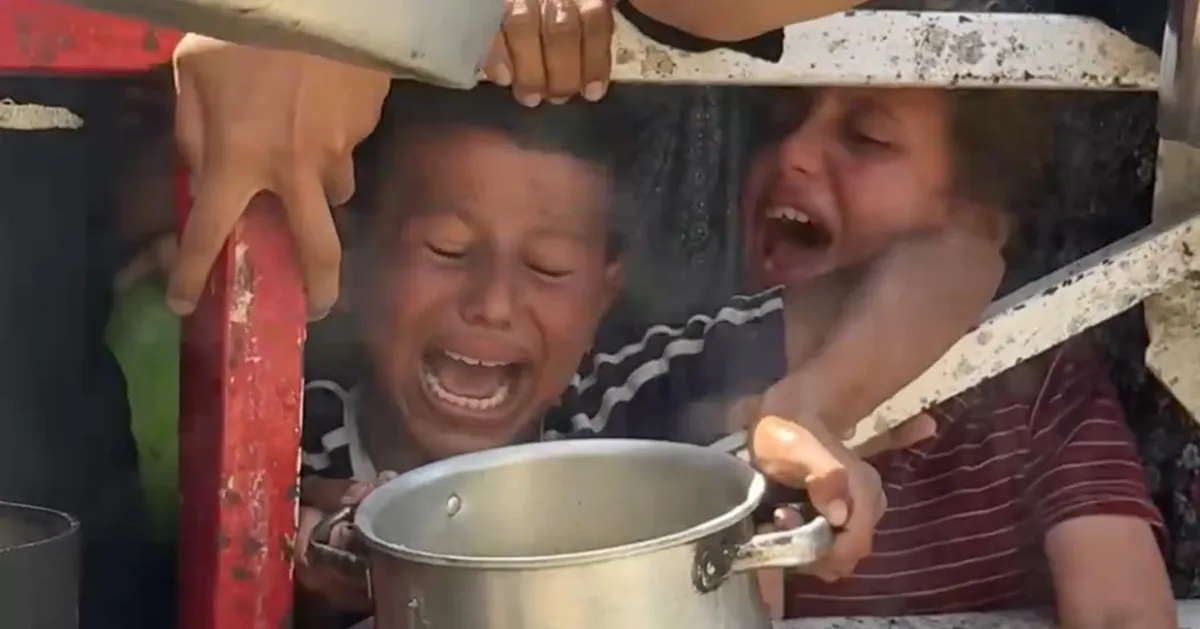
Atef Abu Khater, a 17-year-old boy who was previously healthy, now finds himself battling severe malnutrition in an intensive care unit at a hospital in northern Gaza. His father, A’eed Abu Khater, 48, expressed the despair of their situation during a phone call, stating, “He is not responding to the treatment.” The family, forced to shelter in a tent in Gaza City along with A’eed’s wife and five children, is struggling with the dire consequences of the ongoing war. “I feel helpless,” A’eed lamented, highlighting their loss of income and the unaffordability of food. “There is nothing.”
Since the conflict escalated, Gaza’s hospitals have faced overwhelming challenges, grappling with a surge of patients injured by Israeli airstrikes and shootings aimed at dispersing crowds desperate for food or aid. The situation has worsened, with an alarming rise in patients suffering from starvation. Dr. Ahmed al-Farra, who oversees the pediatric ward at Nasser Hospital in southern Gaza, remarked, “There is no one in Gaza now outside the scope of famine, not even myself.” He echoed the sentiments of many in the region, stating that he, too, is struggling to find food for his own family.
The World Food Program (WFP), a United Nations agency, has reported that the hunger crisis in Gaza has reached “new and astonishing levels of desperation.” Shockingly, a third of the population has gone multiple days without food. The Gaza Ministry of Health has documented over 40 hunger-related fatalities this month alone, including 16 children, and a staggering total of 111 since the onset of the war, with 81 being children. Unfortunately, this data has not been independently verified, raising concerns about the true scale of suffering.
Throughout the conflict, various U.N. agencies and independent aid organizations have accused Israel of allowing insufficient food supplies into Gaza, warning of an impending famine that threatens the region’s more than two million inhabitants. Israel, on the other hand, has claimed that adequate food is reaching Gaza, attributing the distribution issues to Hamas and the mismanagement of aid groups.
The plight of families in Gaza is dire. Yahia al-Najjar, just four months old, tragically succumbed to severe malnutrition at the American Hospital in Khan Younis. His aunt, Safa al-Najjar, recounted that Yahia was born healthy, but his condition rapidly deteriorated as the family, living in a makeshift tent, could only afford one meal a day. Yahia’s mother struggled to produce enough milk to nurse him due to her own malnutrition, and the family could not afford baby formula. Despite the efforts of doctors at the hospital, Yahia was already in critical condition when he arrived.
Following the end of a two-month ceasefire in mid-March, Israel reinstated a total blockade, halting the entry of goods for nearly 80 days. This exacerbated the already critical deprivation faced by Gaza’s residents. Currently, aid enters through two controversial channels: a new system managed by private American contractors under the Gaza Humanitarian Foundation, and convoys from independent international organizations. Both methods have been marred by chaos and violence amid the ongoing conflict.
The humanitarian crisis in Gaza is compounded by allegations and counter-allegations among the parties involved. Israel has accused Hamas of creating a narrative of starvation, claiming that the group loots aid trucks and disrupts distribution efforts. Meanwhile, images of starving children are countered by footage of uncollected aid supplies and claims that Hamas operatives are enjoying food in underground tunnels. These conflicting narratives only deepen the suffering of those in Gaza.
As negotiations for a temporary ceasefire continue, the urgency for humanitarian relief grows. Experts warn that malnutrition, particularly in early childhood, can lead to long-lasting detrimental effects on growth, cognitive ability, and emotional development. Mohammad Saqr, head of the nursing department at Nasser Medical Complex, reported that on a single afternoon, the hospital received numerous requests for intravenous glucose solution from women and children. While such treatments may provide temporary relief, he cautioned that the hunger quickly returns, with some patients arriving “shivering from hunger.”
The situation in Gaza is a heartbreaking reminder of the human cost of conflict. As the international community watches, the need for sustainable solutions and immediate humanitarian aid has never been more critical.